#and I’ll never understand the appeal of christine not choosing raoul
Text
sorry but objectively ‘all I ask of you’ is a better song than ‘music of the night’
#rewatching the 25th anniversary of phantom of the opera cause that’s just what I do when I’m not feeling good#and I’ll never understand the appeal of christine not choosing raoul#like did we not all hear the same song???#I want ‘all I ask of you’ to be playing at my wedding one day
0 notes
Text
The Problem With (Forced) Happy Endings, or, Why I Hate The Phantom of the Opera
Yesterday, I was messing around on here and suggested that I hated the way The Phantom of the Opera ended. Then, I got the following ask:
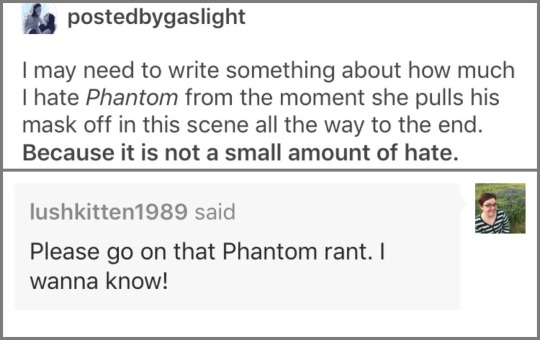
I thought I’d respond briefly, but then things got out of hand. So, @lushkitten1989, as promised, here’s way more than you bargained for.
There are many, many reasons to dislike Andrew Lloyd Webber’s monolithic Broadway musical, The Phantom of the Opera. So, I’ll dispose of some of the lower hanging fruit:
The story is dependent upon Christine being so naive that she doesn’t realize she’s getting music lessons from a guy behind a two-way mirror.
The phantom is a one-trick pony, defined almost entirely by his obsession with Christine. It’s never actually clear what he seeks to achieve by gaining de facto control of the day-to-day operations of the theater (other than merely being able to exercise that control— which may be the point).
Raoul is as interesting as a pet rock. He is unbuttered toast. He is Mom Jeans.
The music is intermittently great, but just as often annoying as hell (to me, for example, the “Angel of Music” motif is grating and uninspired).
Those are fundamental, but relatively minor complaints. Phantom has a lot of strengths. The chemistry between the Phantom and Christine is very pronounced, and, at times, shockingly blatant in its sexual themes. Some of the songs are timeless classics (“Phantom of the Opera,” “Music of the Night,” “All I Ask of You”), and some of the sequences, like the chandelier crashing down on the stage, and the ensemble pieces, like “Masquerade,” are very accomplished.
But where Phantom really shines is building a very genuine feeling tension between what propriety and social mores tell Christine Daae what she should desire, and what she actually desires. Phantom dabbles with Bride of the Monstrous themes, but never goes all in on them, and the result is a muddled, confused mess of a story— one that could have been very, very good, but wasn’t courageous or forward-thinking enough to capitalize on its opportunities.
See, the problem starts with Raoul.

Yes, wonderful, handsome, unthreatening, rich, devoted, patient, loving, convenient Raoul. The honorable Vicomte de Chagny, no less. He is our erstwhile Socially Acceptable Love Interest™️. From the moment he’s introduced, it’s clear Raoul is meant to be Christine’s white knight, swooping in to rescue her from obscurity. The plot contrives to have him coincidentally happen upon Christine, his childhood sweetheart, now a chorus girl at the opera house he favors with his parents’ fortune.
Now, I know what the Phantom fans might say: Raoul is here to allow for a juxtaposition of dynamics, placing him as an anchor point to which Christine can return, reminding her that she is more than the Phantom’s pet (or pupil, or lover, or what have you). But I’d counter that he’s really here to act as a stand-in for society’s expectations for how a well-behaved woman should conduct herself. Raoul is young, conventionally attractive, affluent, and, most importantly, chaste.
Christine’s connections with Raoul are explicitly drawn as being rooted in childish notions of affection. To wit, Raoul First greets Christine with a modified nursery rhyme she was read during their brief time together as children. He visits her in the soft-focus glow of her dressing room, showers her with praise, and proceeds to not listen to her when she insists she can’t go celebrate with him. More than that, he dismisses her objections with little more than a hand wave. The point is, he sees her as a child, and treats her as a child.
Look at what happens the moment he leaves her alone. She looks into the mirror, and runs toward the dark reflection behind her own image (heavy symbolism of Jungian animus here). From their very first physical encounter, the Phantom engages Christine as a sexual creature, and the difference in her reaction is, well:
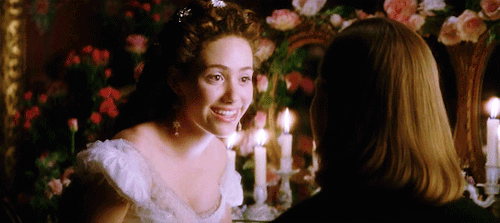
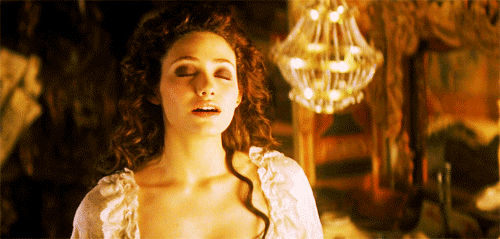
Once alone with the Phantom, Christine is no longer the child so idealized by Raoul. She’s a young woman seeking instruction of a different kind from a strange reflection of herself whose instructions have suddenly changed from anodyne singing lessons to exhortations to “feel the music of the night.”
The next time Christine is with Raoul is when they share their duet, the excellent, “All I Ask of You.” I say excellent because, like other tentpole numbers featured in Webber musicals, the song itself is brilliant, but, in the context of the play, it’s less inspiring. This is rather like “Memory” existing in a pop culture space entirely divorced from its origin in Cats, and I’m certain there are a fair number of people who simply identify the song as a soaring Barbra Streisand number, rather than the mournful plea of a neglected alley cat.
“All I Ask of You” is preceded by Christine trying to tell Raoul about her fear of the Phantom, and her growing unease at the magnetic pull he seems wield against her. Raoul’s immediate and repeated reaction? Something to the effect of: “There is no Phantom of the Opera. You’re imagining things. Don’t be silly.” The song then drives this home:
No more talk of darkness—Forget these wild-eyed fears—I’m here, nothing can harm you—My words will warm and calm you.
The call and response Christine and Raoul have here is staged as a sweet love song. And it is. But it’s also a proposal from a young man to a young woman, where the man suggests she abandon her desires to exist as a sexual being, and come be with him, where he’ll act as her protector against such base instincts.
And this tactic works. Christine is not so frightened of the Phantom himself— she pays lip service to being horrified at his murderous tendencies, but seems aware he would never harm her personally— as she is frightened of her seeming inability to resist her attraction to him.
Raoul positions himself as a shield Christine can hide behind so she never has to grow up. He prefers her as the girl who enchanted him when they were both children, and he’ll go to great lengths to keep her innocent and doe-eyed. Is it any wonder that Christine doesn’t want their engagement to be public? (Yes, I get that Christine doesn’t want to risk the Phantom’s wrath should he discover their impending marriage, but the whole thing looks more like Christine being very unsure as to what she really wants).
Raoul, who seems to be the only person in the play who continues to explicitly deny the existence of the Phantom into the second act, is, oddly, the first to run for a weapon when the Phantom shows himself. He’s the one who pushes Christine to acknowledge (falsely, I think) that her attraction to the Phantom is nothing more than a side-effect of Daddy issues. He insistently pushes forward with a plan to permanently rid both the Opera Populaire and Christine of the Phantom despite Christine’s warnings that Raoul doesn’t really understand what he’s fighting against. More than that, Raoul insists that Christine offer herself up as bait, and to do so publicly, an overt expression of control, of making her choose her loyalties in front of everyone.
Let’s pause a moment here before we get to the inflection point of the play. What I’m referencing is, of course, the aptly titled “Point of No Return,” wherein the true nature of Christine’s relationship with the Phantom is made public. I want to talk about the Phantom.
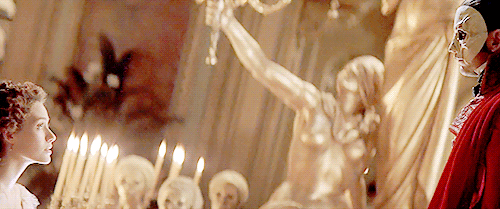
Throughout the entire play, the Phantom is presented as a sympathetic figure coded to represent misfit and outcast elements of society. He refers to himself as a “loathesome gargoyle” and confesses to Christine that he lashes out at the world and makes others fear him because he feels it’s his only choice for survival. But he also confesses to her that he secretly dreams of love and acceptance, and being able to live as he is, free from the condemnation of the wider world.
Yes, the Phantom expresses his displeasure with being defied in very unhealthy ways, but here we are again at the Death and the Maiden trope, wherein our heroine is the only person who is able to see beyond the darkness that both conceals and protects the man behind the mask. Here, Christine should be acting as the Phantom’s succor, a balm to his constant pain, and, in playing that part, she is meant to end his curse, or blunt its effects sufficiently enough for him to find peace. And, in return, the Phantom ought to provide Christine with growth beyond her childhood, and, in this version of events, usher in her sexual awakening and facilitate her passage into womanhood.
And it’s all set up to do that, for those themes to be realized, by the time the finale is cued up. Then, everything just goes to shit.
The Problem
If you’re unfamiliar with the way The Phantom of the Opera ends, you may want to stop reading.
After Christine stops Raoul from killing the Phantom in the graveyard, Raoul and the other peripheral characters contrive a plan to lure the Phantom into the open and kill or arrest him once and for all. The plan is simple enough. The Phantom has written an opera (aptly titled Don Juan Triumphant), and has ordered it be performed with Christine as the lead. Everyone assumes the Phantom will strike during the performance, most likely to claim Christine as his bride (or something like that).
Now, I posted a little joke earlier about what happens before the plan goes into effect. Raoul goes to Christine to comfort her and prepare her for her role in the trap, but Christine is very nervous about it. She tries to convey to Raoul why she’s apprehensive about the whole plan, but, again, Raoul doesn’t get it, and insists that Christine is getting worked up for nothing.
Of course, what ends up happening is “The Point of No Return,” the high point of the whole play, where the Phantom sheds all pretense and makes an overtly sexual appeal to Christine. And Christine, who’s supposed to be playing the role of Don Juan’s paramour, reciprocates the Phantom’s ardor, resulting in a very, very sexy sequence between the two of them. All while Raoul watches from the Phantom’s favored balcony (Box Five), and something like this happens:
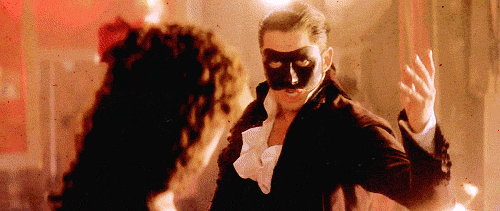
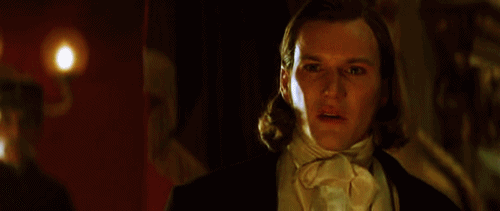
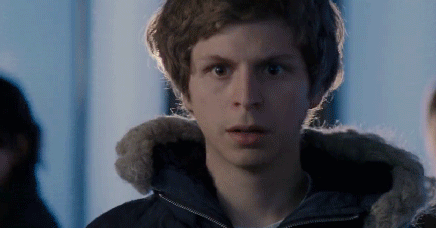
The Phantom speaks directly to Christine, saying:
I have brought you— so our passions may fuse and merge— in your mind, you’ve already succumbed to me— dropped all defenses, completely succumbed to me— now I am here with you— no second thoughts— you’ve decided—
To which Christine responds:
I have come here— hardly knowing the reason why— in my mind I’ve already imagined— our bodies entwining, defenseless and silent— now I am here with you— no second thoughts— I’ve decided—
This whole time, while the call and response between Christine and the Phantom reaches its fever pitch, Raoul watches, and understands the depth of his miscalculation. More than that, he’s horrified and repulsed by this display of lust from his innocent Christine. The mere suggestion that she might be complicit in the Phantom’s passions is something that, it can be observed above, threatens to break his world apart.
Thematically, this mirrors Raoul and Christine’s mutual declaration of chaste love in “All I Ask of You.” Which is important, because once the Phantom and Christine have crossed the metaphorical and literal bridge that separates them, and are embraced for all the world to see, the Phantom expands his entreaty, shifting from the blood-racing heat of “Point of No Return” to a soft, pleading reprise of “All I Ask of You.” He wants Christine to know he doesn’t just want her body, that he doesn’t just view her as a possession. That he loves her, just as much or more than Raoul.
And here is where Phantom could have become something great. Christine breaks free of the intoxicant of lust for the Phantom and turns to face him. He is emboldened, and reaches a more confident crescendo, saying
Anywhere you go, let me go, too— Christine, that’s all I ask of—
But the Phantom never finishes his sentence. Christine makes her choice, for sure. She does this. In front of the whole world. When the Phantom is most sincere and vulnerable.
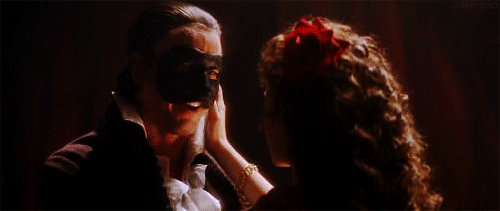
Now, I might have been prepared to forgive Christine this mistake if not for the scene earlier, when she and the Phantom were alone, and she tried to remove his mask. He lashed out at her then, and proceeded to explain his sensitivity to being exposed. He opened up to her and revealed his vulnerability. And, above, when the Phantom has finally allowed himself to hope that Christine’s affections are sincere and reciprocated, she betrays him.
It horrifies me.
For the rest of the play, all the sympathy the audience has been conditioned to direct toward the Phantom is inverted. Christine shows affection to him only to trap him. She even kisses him, leading him on again, for no reason but to quell his rage toward Raoul. Even after his beastly rage has subsided, Christine can only chide him for being monstrous in body and spirit.
This haunted face holds no horror for me now— it’s in your soul that the true distortion lies—
The arc presented for the audience— to sympathize with the Phantom, and to experience with Christine the fear and wonder that can attend the awakening of sexual consciousness, is utterly squandered.
But why?
Happily Ever After
The answer is as simple as it is disheartening: because Christine is supposed to end up with Raoul. Raoul is her destined love interest because the plot demands it, and no other reason. The two of them don’t grow as a couple during the course of the play. Their dynamic as they leave the Phantom’s lair is unchanged from the dynamic they presented when Raoul came to see her in her dressing room at the beginning of the play. Even after being forced to acknowledge Christine as a complicated and sexual being, Raoul elects to ignore that, and champions only freeing her from the Phantom’s corrupting influence.
To come to this point, Christine’s character actually regresses, choosing to retreat behind Raoul’s promise of perpetual innocence and naïveté. The narrative turns from one of growth and sexual agency to one that urges the rejection of what is unpleasant to acknowledge. Christine essentially chooses to marry the nice guy with the trust fund, stays at home to raise the kids and play the doting wife, and occasionally allows herself moments of indulgence to fantasize about the tall, dark, mysterious man she always wanted to fuck back in college.
To make matters even worse, the Phantom is abandoned to misery and solitude. His suffering is rewarded with more suffering. Christine leaves him without hope or promise, and the Phantom remains shrouded in the dark, pining for Christine for the rest of his life. Through trusting and hoping for acceptance and love, the Phantom is shown only the futility of seeking either. The way this plays out is deeply disconcerting, going so far as to set up a prologue and epilogue set fifty years later, after Christine’s death, with a grieving, crippled Raoul learning that the Phantom is still alive. This represents a casual erasure of Christine’s presence from the narrative, and, worse, diminishes her role to that of the object of the struggle between two men over a young woman’s emotional and sexual destiny.
This is an ugly, sad, wretched story. It’s not a story of yearning or forbidden love. It’s a story about rejection and denial of desire. It’s a story about choosing what society deems acceptable over the needs of the self. Moreover, it’s a story about being afraid and remaining afraid.
There is nothing affirming or beautiful about this story. And I fucking hate it.
#phantom of the opera#phantom x christine#raoul de chagny#christine daae#happily never after#what a waste
1K notes
·
View notes